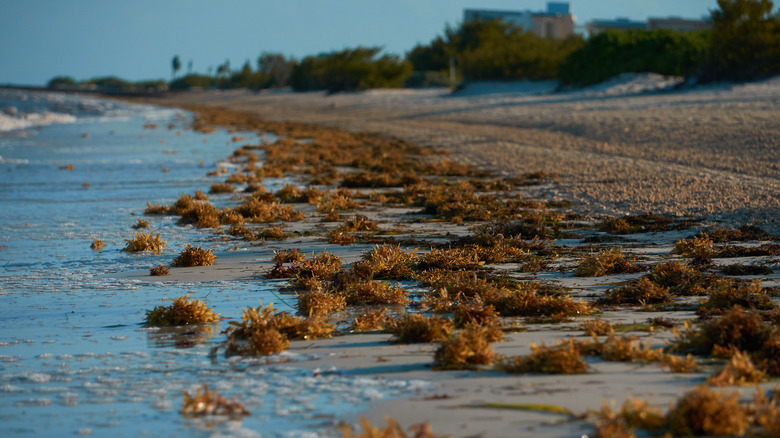How To Protect Your Skin From The Dangers Of Ocean Water This Summer
Sun, sand, salt water, and ... skin issues? While ocean water isn't necessarily bad for your skin, frequent swims combined with rough sand and UV ray bombardment from the sun can take a toll. But before you unpack your beach bag and decide against wading into the water this summer, let's look at the benefits of ocean water.
Obviously, seawater contains salt; if you've ever had the misfortune of getting some in your eyes or in an open cut, you're likely aware of its salinity. But swimming in this salty water can be excellent for exfoliation. In addition to salt, ocean water also contains a wealth of naturally occurring minerals like magnesium, zinc, and calcium. Deep sea water, extracted from depths reaching 200 meters, has been found to decrease skin issues like swelling, dryness, itchiness, and redness. However, you don't have to go deep sea diving to enjoy ocean water benefits. Salt water is antibacterial and antimicrobial, meaning that sea salt may help treat acne.
So really, there is no need to swear off the sea this summer, as diving in can benefit your skin. Nevertheless, you can have too much of a good thing, which is where ocean water dangers arise. Whether you're staying seaside for the summer or only visiting for a week, these are the tips you need to protect your skin.
What to be wary of with ocean water
Most ocean water isn't bad, though there are some places where pollution can be an issue. If there are high toxicity levels due to an accidental spill or runoff, it's best to avoid swimming. These chemicals could irritate your skin and potentially cause worse health complications. Natural skin concerns from the ocean come in the form of sargassum seaweed blooms. These floating blobs of seaweed can irritate the skin if you touch or swim in them.
Normal seawater may become an issue if you're frequently swimming and not caring for your skin. Constant exposure to the ocean combined with time in the sun and sand may lead to dry, irritated skin. Letting salt water air dry on your hair and body is particularly harsh for your epidermis and can leave your hair brittle (as can sea salt sprays). Additionally, scientists found that time spent in the ocean can alter the bacteria on your skin, known as your microbiome.
When salt water eliminates some bacteria (like the acne-causing kind), there are benefits. But if too many of your normal, healthy bacteria are killed, it can be problematic. Marisa Chattman Nielsen, MS, lead author of the study, said, "While swimming, normal resident bacteria were washed off while ocean bacteria were deposited onto the skin," this could make it harder for your body to fight off germs, putting you at risk of infection. Thankfully, you can take steps to protect your skin and your health from ocean water.
Safe swimming and skincare
Sometimes, avoiding the ocean altogether is best. If there's a seaweed bloom or a potential for water pollution, it's best to postpone your beach trip. Usually, your local authorities will let you know when the water isn't safe. During times of increased toxicity, staying out of the water is the best way to protect your skin. Even if there are no water quality alerts, you might want to refrain from swimming if you have an open wound. Not only will it be painful, but you'll be risking exposure to bacteria that could cause the cut to become infected.
If the water is safe for swimming, you'll want to use a proper after-swim skincare routine to keep your outermost layer healthy and happy. When you're done splashing in the waves, rinse off with fresh water. Remove all sand particles and gently scrub your skin to wash away salt build-up. Thankfully, most public beaches and swim areas have convenient showers available for use.
After you're all clean, soothe your skin with a moisturizer. Typically, it's best not to air dry, but to pat yourself down and apply a thicker moisturizer or ointment. Using a hydrating formula from head to toe will help combat dryness caused by the sun, sand, and salt water. Lathering up before bed can be particularly helpful so that your skin has plenty of time to soak everything in. But remember, if your next stop isn't indoors, add a layer of SPF over your moisturizer.

